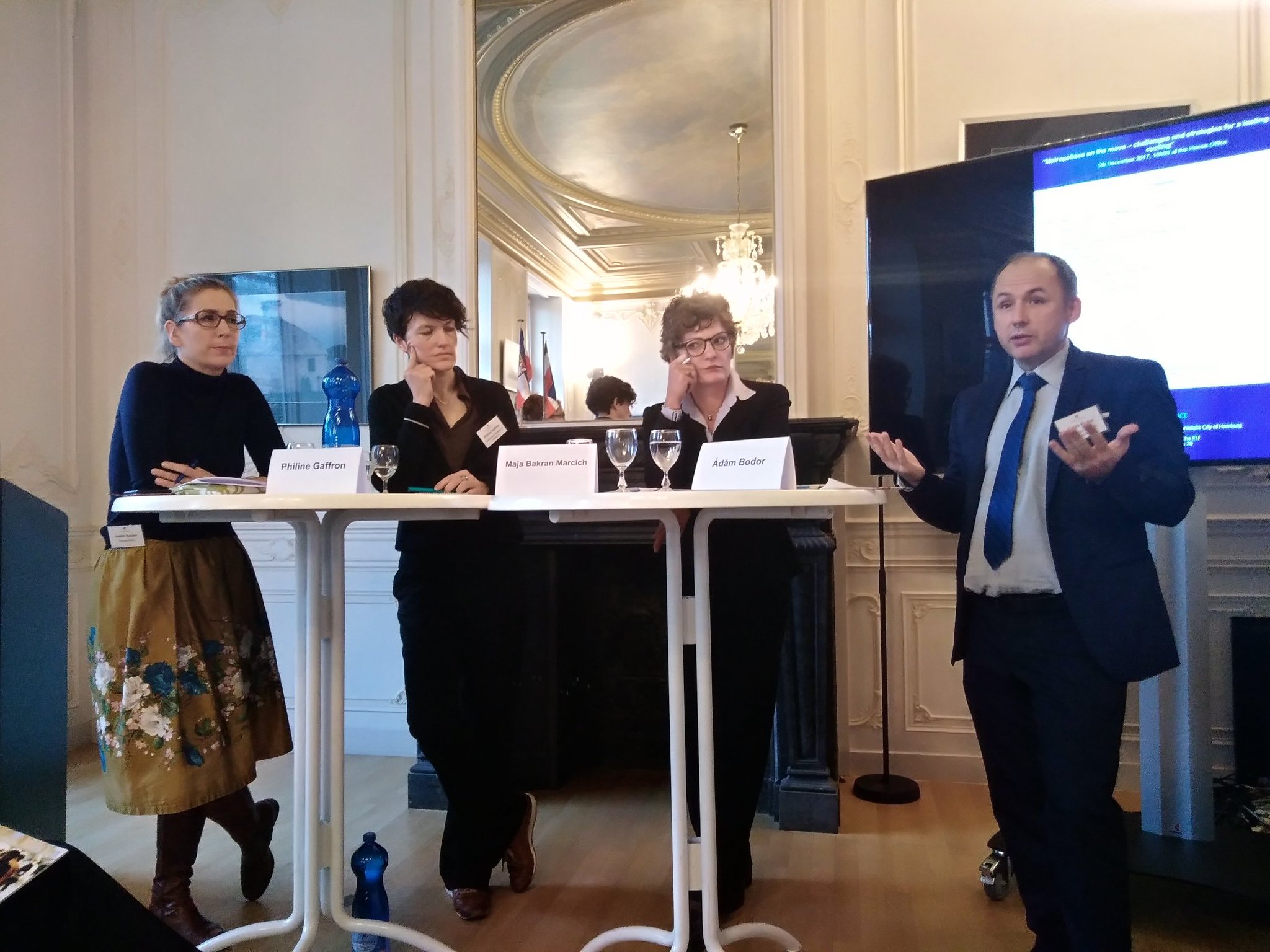
Put cycling into all possible avenues – The discussion on a EU Cycling Strategy continues
Toxic air pollutants, congested streets, adapting to climate change – these are some of the challenges that representatives from London, Brussels and Hamburg identified at the “Metropolises on the move – challenges and strategies for a lasting shift to cycling” event, kindly hosted by the Brussels Hanse Office on December 5. In a panel debate, European stakeholders, including ECF, shed their lights on the added value of EU action.
That cycling is part of the solution to address these challenges was uncontroversial at this event. Andrew Summers, Strategy and Policy Manager for Active Travel and Health at Transport for London, pointed out that the British capital intends to increase the combined mode share of walking, cycling and public transport to 80 % by 2041, up from 64 % in 2015. To achieve that objective, the city explores new ideas, such as zero car parking in new real estate developments near public transport stations. To overcome public push-backs, “educating businesses of the economic opportunities through more customers coming by bicycle is crucial”, Summers said.
Parking was also identified as an important measure by Kirsten Pfaue, Hamburg’s bicycle coordinator. The city will invest 31 million Euro by 2025 to build 28,000 bicycle parking spots at public transport hubs to facilitate Bike&Ride, she announced. Beyond the hardware, the city works in a holistic manner by implementing soft- and orgware measures too. “We managed to get all 7 boroughs to sign up to a common Charter”, Pfaue described as a breakthrough in the cities efforts to grow cycling.
Pascal Smet, Minister for Transport and Public Works at the Brussels Capital Region, has to work with 19 communes, and that is slowing down progress, he said. Nonetheless, Brussels is taking important measures to turn it into place for people, not cars, he added. “Road space reallocation from cars to cycling is the main challenge. It can only have success with a good stakeholder consultation!”
If reallocating road space in favour of active modes is among the toughest jobs at local level, then getting transport prices right is perhaps the main challenge at European and national level. Bas Eickhout, a Dutch Green Member of European Parliament said: “Many Member States policies stimulate car use. If we don't get our fiscal and economic policies right, cycling will remain an add-on for cities.”
In the subsequent panel debate between Maja Bakran-Marcich, Deputy Director-General of the European Commission’s DG MOVE, Philline Grafon, Researcher at the Technical University of Hamburg and Adam Bodor, ECF’s Advocacy Director, the focus shifted on the added value of EU action in growing cycling. Bakran-Marcich announced the publication of the 3rd Mobility Package for May 2018 which will see various initiatives on road safety with the aim of making motorised vehicles safer for active transport users. While strongly welcomed by ECF, Bodor took the opportunity to reiterate calls for a EU Cycling Strategy. “This will help deliver a level-playing field for transport with other modes of transport”, he said. The 2017 EU Cycling Strategy Recommendations document had estimated that cycling across the EU could grow by 50 % by 2030, if cycling received similar support seen historically for other modes of transport.
Graffon strongly agreed with Bodor on the need to make cycling policies more visible at EU level through a strategic document on cycling: “You need to put cycling into all possible avenues”, she said.
Links:
More on the EU Cycling Strategy: www.cyclingstrategy.eu
More on the event:
- Invitation: http://hanse-office.de/files/invitation_cycling_policy_event_hanse_office_51217.pdf
- Welcome by Dr. Claus Müller, Director Hanse Office: http://hanse-office.de/files/hol-hh_begruessung_radstadt_formatiert.pdf
- Presentation Andrew Summers, Transport for London: http://hanse-office.de/files/london_cycling_slides_05.12.17_v2.0.pdf
Presentation Kirsten Pfaue, City of Hamburg: http://hanse-office.de/files/vortrag_vr_praesentation_en_final_short_mail.pdf
Contact the author
Recent news!
Upcoming events
Contact Us
Avenue des Arts, 7-8
Postal address: Rue de la Charité, 22
1210 Brussels, Belgium









